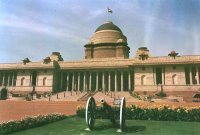
Surprise! Surprise! I drop in at the ongoing Spanish Film Festival in New Delhi today and find an India-centric film being screened. Can't believe my luck.
Larry Levene's 2003 masterpiece
Cesar Y Zain (Cesar and Zain) is not a feature film in the conventional sense - it has running commentary and video clips of Bush, the war on Iraq and how Islam is being perceived as a threat by the West.
But it is also a film documenting a poignant cultural and religious exchange. Two young men - Cesar from Madrid and Zain from Delhi - become internet pals thanks to a common love for chess. The two friends evince interest in each other's cultures and decide to
switch families for six weeks.
The Roman Catholic (although not practising) Cesar settles in with Zain's Muslim family in the backlanes of Chandni Chowk while Zain travels to Madrid to meet Cesar's kin. Interestingly, the two young protagonists never meet in person before the exchange.
The documentary - Yes! It is one...Although never for a second as boring as conventional documentaries - goes on to record the youths' experiences in their respective milieux.
Cesar records on his camcorder a harrowing picture of life in Old Delhi - a dead cow blocking traffic, lepers at the Nizamuddin shrine, abject poverty and over- population. Director Levene, who was also present at the screening, came in for criticism from one disgruntled viewer.
"India has progressed so much. And yet you chose to depict its poverty. Why wasn't Cesar exposed to other parts of Delhi?" the lady said.
Indeed, there were pleasant images too. An insight into the Muslim way of life, of kids flying kites on rooftops, of street children breaking out into smiles on sighting the camera (prompting Cesar to comment they are the happiest people he has ever met), of Kirori Mal students waxing forth on politics and Iraq.
Meanwhile in Madrid, Zain is shocked by life in Spain. Pre-marital sex, marijuana at club parties and gay pride parades come as a huge culture shock for the 23-year-old Muslim. He is particularly disgusted by the way "loving" parents are soon relegated to old-age homes in Spain.
He questions Cesar's friends on these issues and they in turn debate the practice of arranged marriage in India. It's not as if Zain is uncomfortable - he learns to love the freedom enjoyed by young people in Spain.
Other topics discussed by Cesar and Zain - spicy food, Indian-style toilets, how Muslims can't eat certain varieties of meat, education of women, couples holding hands inside protected monuments, oil crisis in the West. Indeed, director Levene has a humourous take on every conceivable issue.
The six weeks fly by quickly and soon it's time for the two friends to return to their respective homes. It's an emotional farewell for both Cesar and Zain - who find it hard to leave their second homes.

Dealing as it did with a politically incorrect subject, the film did raise some hackles at the post-film Q and A session. Some members of the audience did not take too kindly to the fact that the "heart of India" - Old Delhi - is described as a Muslim area.
"India is a Hindu country," one vociferous woman proclaimed, only to be booed by other members of the audience.
"Why couldn't have Zain been from Pakistan instead?" one viewer - a filmmaker himself - queried. "The movie is biased."
Fat chance - considering the movie is based on real-life incidents and real-life protagonists.
Before Levene, who was clearly uncomfortable by now, could answer - the session degenerated into a debate between sections of the audience.
Guys, it's only a film. It's an interpretation - not Gospel truth. I leave.
Disgusted.
P.S. But even I couldn't forgive Levene this. The narrator in
Cesar Y Zane describes Bollywood films as being made in Hindustani - a mixture of
Hindu and Urdu.
 Young Kevin Covais is out of American Idol. Not that he was one of my favourites, but I kind of admired his confidence at such a young age.
Young Kevin Covais is out of American Idol. Not that he was one of my favourites, but I kind of admired his confidence at such a young age.















